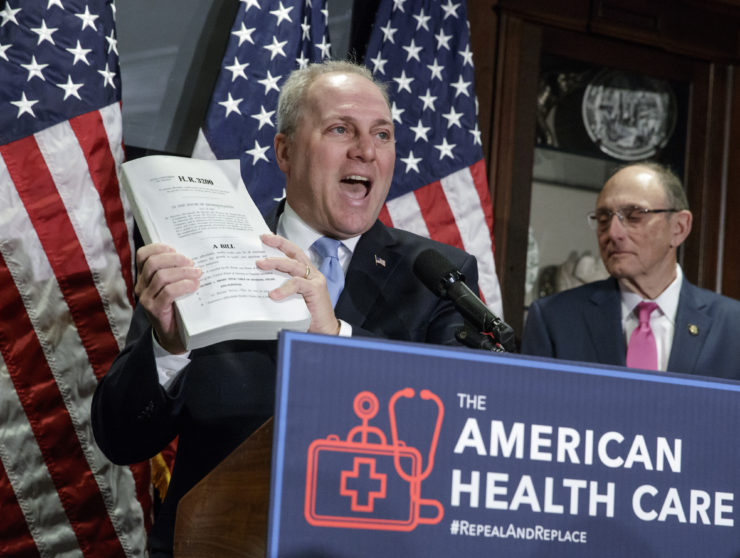
House Majority Whip Steve Scalise holds up a copy of the original Affordable Care Act bill during a March 8 news conference discussing the GOP’s plan to repeal and replace Obamacare. Despite its many merits, the primary media narrative surrounding Obamacare was about its unpopularity
The federal government implemented a policy that helped reduce the deficit and how much senior citizens had to pay for drug prescriptions they otherwise couldn’t afford. The policy made it easier for everyday Americans to make ends meet and reduced the number of unintended pregnancies, which contributed to the abortion rate falling to its lowest level on record.
It cost less than originally projected and reduced inequality. It has literally been saving lives. While analysts debate over the actual number of lives saved, in hospitals alone it meant nearly 90,000 fewer preventable deaths between 2010-2014, according to some estimates. But before the potential repeal of the Affordable Care Act became a distinct possibility since the conclusion of the 2016 election cycle, the primary media narrative was about its unpopularity and its failures. Why? Because despite specious claims about liberal bias, journalists of all stripes suffer one kind of bias more than any other, a No-Good News bias, particularly when it concerns government.
The truth is, we know careers are more likely to be enhanced by exposing political corruption than political competence. Journalists will be allowed to spend several weeks, months, even years, in the pursuit of uncovering how something went wrong, and not nearly as much time to dissect why something went right. Pulitzers are won by tracking police shootings and the dearth of convictions even when cops go astray, by exposing a lack of seriousness among legislators to protect women from an epidemic of domestic abuse in their state. A thousand cases of men doing well years after being released early from prison won’t get nearly as many headlines as one who rapes, robs, or murders again. Besides, it’s just easier to detail the warning signs those paid to protect us missed before a successful terrorist attack than illustrate all the potential attacks thwarted by those same imperfect leaders.
That bias has served us well, brought down corrupt presidents and governors and CEOs and protected children from pedophile priests and lead paint poisoning. There is no better way to prove yourself a watchdog rather than a lapdog by reminding the public about governmental mistakes. That No-Good News bias has saved lives, too, and served as a foundational hallmark of our democracy. It is invaluable and should be cherished.
But it also must be buttressed, because sometimes instead of afflicting the comfortable, that attitude can inadvertently afflict the already-afflicted. Those on the margins of society—the voice-less the media is supposed to be giving voice to—are less likely to receive assistance, and policies that are likely to further marginalize them will take root. When the media does a poor job articulating the clear benefits of successful economic, social and health policy, it makes it harder for effective policies to gain support or be improved upon, jeopardizing the well-being of the neediest among us. The Affordable Care Act is just one example of that truism.
That doesn’t mean flaws in even good policy should be ignored or papered over. From an objective standpoint, the health reform law is far from perfect. Concerns about affordable coverage, high deductibles and out-of-pocket costs and a lack of competition in the exchanges in numerous counties are real. Examining the effect ACA regulations have on the doctor-patient relationship and the balance of individual versus corporate liberty when it comes to the faith-based debate over contraception, is crucial, as is holding politicians to their word when they claim “if you like your plan you can keep your plan” even as they are implementing a massive reform designed to bring massive change.
And yet, if that becomes the primary or only focus, if those questions are allowed to drown out the enormous good that an imperfect policy has meant in the lives of real people, it is less likely to be sustained or improved upon. And when that happens, the people who can least afford an undoing of that progress become the most likely to be hurt.
That’s why our ethical responsibilities as journalists mustn’t only be about making sure every story is fair and accurate. It’s not only doctors who need reminding to do no harm.


